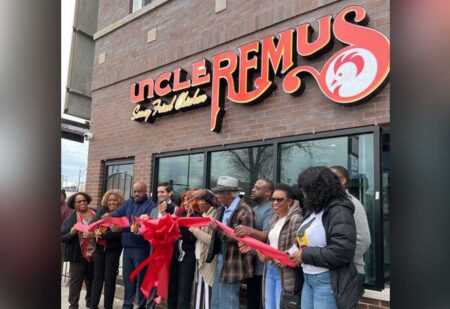A reputed member of a violent Chicago street gang known as the “Goonies” pleaded guilty just hours before his racketeering trial was set to begin Tuesday, admitting that he supplied a stream of guns to his fellow gang members that were later used in slayings and other shootings.
Nathaniel McElroy, 26, pleaded guilty to one count of racketeering conspiracy in a plea agreement with prosecutors that does not include any expectation of cooperation. Prosecutors said preliminary calculations call for a 20-year prison term for McElroy, while his attorneys will argue he should face no more than three years behind bars.
McElroy is already serving a four-year term after pleading guilty in 2019 to a scheme where firearms were straw purchased from gun shops in Michigan and trafficked to Chicago’s South Side, where they were quickly put to work on the streets by the Goonie gang, an offshoot of the Gangster Disciples.
The last-minute guilty plea Tuesday came shortly before jury selection began for three of McElroy’s alleged associates: Romeo “O-Dog” Blackman, 27, who was the alleged leader of the Goonies, and top henchman Terrance “T” Smith, 27, and Jolicious “Jo Jo” Turman, 31.
The trial before U.S. District Judge John Robert Blakey is taking place under heavy security, with metal detectors posted outside the courtroom and spectators required to lock up their cellphones. In addition, many of the pretrial filings detailing specific evidence and witnesses in the case have been kept under seal.
The trial is expected to last up to seven weeks and will include graphic evidence of a reign of terror in the Englewood community that prosecutors say targeted rivals and innocent victims alike, including 10 murders and five attempted murders in an 18-month span from 2014 to 2016.
Opening statements are expected later this week.
The Goonies trial is the latest in a string of major racketeering cases brought by the U.S. attorney’s office aimed at the leaders of Chicago’s splintered gang factions that prosecutors say are driving the city’s rampant gun violence.
In November, a federal jury found the reputed leader of Chicago’s Wicked Town gang faction and one of his top lieutenants guilty of racketeering conspiracy involving a string of murders, shootings, robberies and narcotics trafficking on the West Side stretching back two decades.
Later this year, five alleged members of the South Side’s “O Block” gang faction are set to go to trial on a racketeering conspiracy indictment accusing them of a pattern of violence that includes the downtown slaying of Chicago rapper FBG Duck in 2020.
Unlike traditional racketeering cases that accuse gang members of using violence to protect drug turf or other illicit enterprises, the charges against the Goonies alleged they shot people simply to boost their social media brand.
“It was killing for the sake of killing,” Chicago police Sgt. Charles Daly, who helped put the case together, told the Tribune when the indictment was brought in 2018.
Among the evidence is a disturbing video that was streamed live on Facebook following the January 2016 slaying of a Goonie rival. In the video, about a dozen members of the gang, some as young as 14, wave guns in front of the camera and dance as they taunt the victim, chanting, “How the f— did he get hit?” and “One in the head, no lie.”
Other victims, including Gerald Sias Jr., were just at the wrong place at the wrong time. Sias was getting his hair cut in a popular neighborhood barbershop on a weekday afternoon in 2016 when a gunman suddenly appeared in the doorway and opened fire.
As patrons scrambled to hide behind chairs, Sias, 38, a father of five with no gang ties, was struck in the arm and died later at a nearby hospital. Another customer was wounded in the leg.
Sias’ father, Gerald Sr., told the Tribune in 2018 that his son was simply trying to get his hair cut for a party on the day he was killed. Asked about the allegations that the gunmen were committing violence simply for street status, the father called the situation “crazy.”
“You wake up and put your clothes on to go kill somebody that don’t never done nothing to you? That’s crazy,” he said.
The final murder alleged in the indictment occurred July 1, 2016, when Kenneth Whitaker, 34, a security guard with no gang ties, was shot twice in the head in July 2016 while walking past an elementary school at 74th and Morgan streets.
At the time, the Goonies were out for revenge after one of their own had been slain earlier that night, sources told the Tribune. The indictment alleged the gunman had just left a nearby hospital when Turman opened fire on Whitaker.
In a sign of the fractured and often fickle nature of gang cliques in Chicago, the case against the Goonies was built largely on social media and jail calls, not traditional wiretaps.
Jurors are expected to be shown numerous Facebook videos during the trial where the defendants and other gang associates allegedly boast about killing rivals and flamboyantly display their arsenal of guns, some with extended magazines, on publicly available platforms.
One of those videos was played by prosecutors at a detention hearing in McElroy’s separate gun case, showing McElroy and other Goonie members brandishing firearms and laughing about committing acts of violence. said at the time she found the “glee and exuberance” on the gang members’ faces appalling.
“I have never seen anything like this in my life,” Cox said. “It is shocking to me that you could laugh about a gun like it is a toy. … Some of those kids look like they were 14 or 15 years old. And this is their life?”
In his 18-page plea agreement entered Tuesday, McElroy admitted that he sold narcotics in Chicago and the suburbs to help bankroll the purchase of firearms for the gang, which he often gave out to juvenile members known as “shorties” for use on the street. Many of the guns were purchased by straw buyers at stores in Kalamazoo, Michigan, who were paid a $150 fee by McElroy for their troubles.
Among the guns McElroy procured was the gun used to kill Sias and wound another patron in Powell’s Barbershop on West 63rd Street, according to the plea.
In a sentencing memo in McElroy’s separate gun case, prosecutors said McElroy was caught on wiretapped calls talking to an associate about how easy it was to get guns in Michigan.
Afternoon Briefing
Daily
Chicago Tribune editors’ top story picks, delivered to your inbox each afternoon.
“It’s sweet cuz,” McElroy said on one call in February 2017, according to the filing. “I did the (expletive) a hundred times.”
When the associate, who was secretly cooperating with authorities, worried about potential criminal exposure, McElroy assured him that nothing would come of it, according to prosecutors.
“Guns are misdemeanors out there,” McElroy said. “You can get as many as you want. They a misdemeanor. You get bumped off, you straight. You be out the same night.”
McElroy’s attorneys argued for leniency in that case, noting his young age at the time of his arrest and his troubled background, being forced to fend for himself in a rough neighborhood before a brief and unsuccessful stint living with relatives in Iowa to escape the violence of the streets.
In asking for a stiff sentence for McElroy, however, Assistant U.S. Attorney Albert Berry wrote that the illegal trafficking of firearms that McElroy engaged in key contributor to that seemingly never-ending cycle.
“Nathaniel McElroy is one in a long list of individuals that has contributed to the pain inflicted upon families due to the gun violence in Chicago,” Berry wrote.
jmeisner@chicagotribune.com







